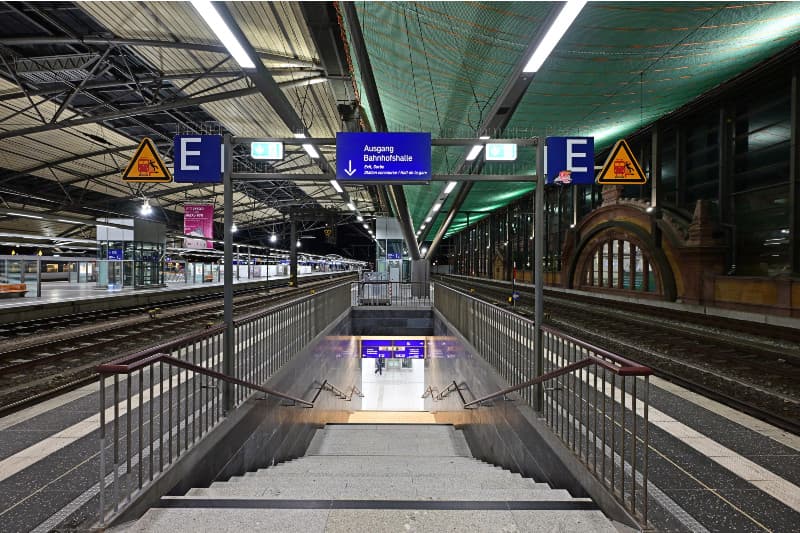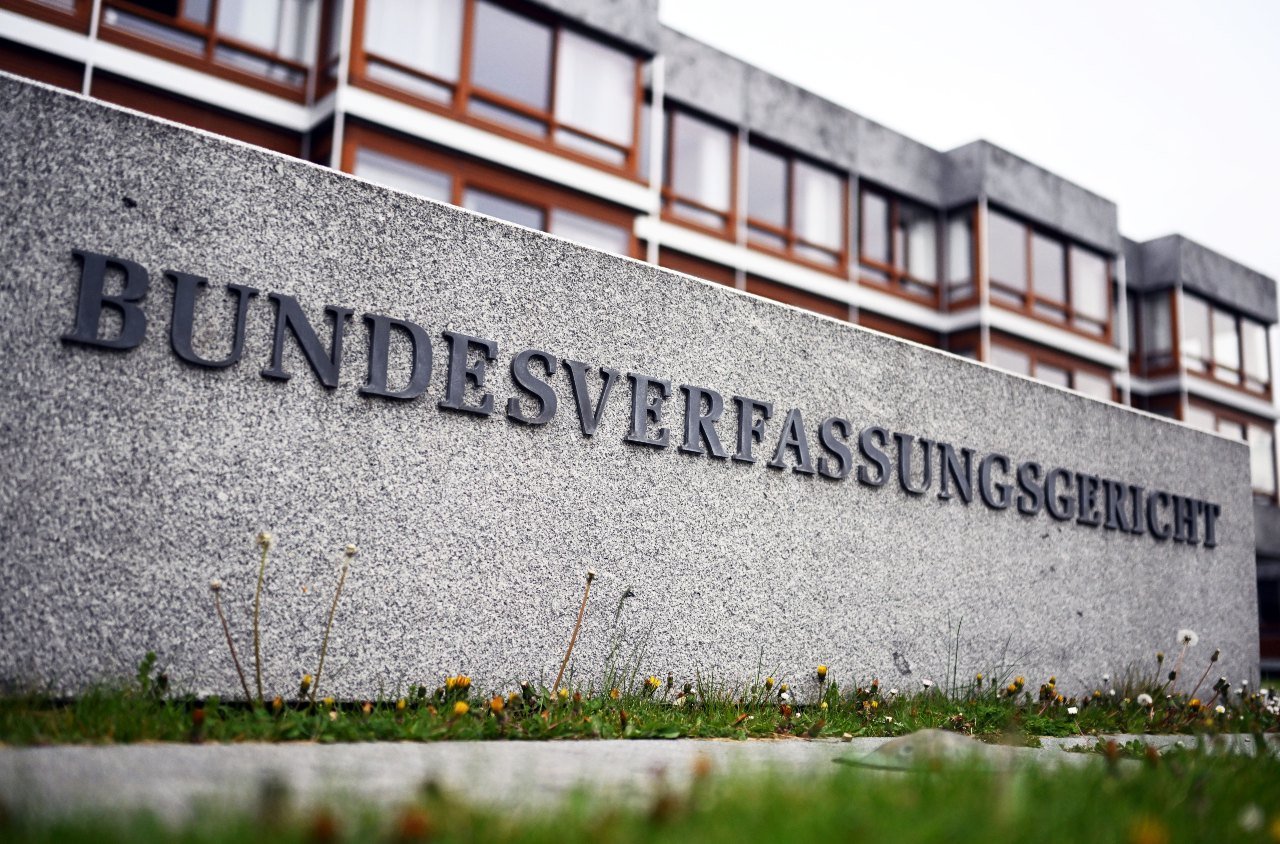Today in Germany: A roundup of the latest news on Thursday

Deadlock in the Deutsche Bahn negotiations, calls for a new federal election, and more news from around Germany on Thursday.
Commuters hit hardest by nationwide rail strikes
The warning strike by the German Train Drivers' Union (GDL) hit commuters particularly hard on Thursday morning.
"In some regions, there were no trains at all due to the strike participation," Deutsche Bahn announced online.
However, the emergency timetable has started but offers only around 20 percent of the originally planned long-distance journeys. The effects on local and regional transport vary greatly depending on the level of participation in the strikes.
In North Rhine-Westphalia, for example, individual signal boxes were not manned in the morning - meaning that the warning strike there also has an impact on other railway companies, as entire sections of track cannot be used without a dispatcher.
A spokesperson for Berlin and Brandenburg announced that replacement buses would be used on individual routes.
Deutsche Bahn cancels talks with GDL after strikes
The warning strike called by the German Train Drivers' Union (GDL) on Wednesday and Thursday will see more than trains come to a standstill: in response to the industrial action, Deutsche Bahn has called off this week's talks as well.
"Either you go on strike or you negotiate," chief HR officer Martin Seiler said of the decision to postpone negotiations. "You can't do both at the same time."
During last week's talks, both sides had agreed on a tight negotiating schedule that would pack in eight meetings within five weeks, with the second round set for Thursday and Friday. "Anyone who breaks the agreement in this form and calls strikes at short notice cannot expect us to simply continue sitting at the negotiating table," Seiler said.
READ ALSO: What you need to know about Germany's train strike starting Wednesday
In a surprise move the week after negotiations kicked off, the GDL called a warning strike starting on 10pm on Wednesday and running until 6pm on Thursday.
Train drivers, train attendants, workshop workers and dispatchers were all called to take part, with Deutsche Bahn estimating that 80 percent long distance services would be affected. There are also set to be significant restrictions in regional and freight transport.
Germany's interior minister announced on Thursday morning that raids had taken place in seven of the country's regions on an Islamist association suspected of links to Lebanon's Shiite Hezbollah group.
"At a time when numerous Jews feel particularly threatened" Germany will "not tolerate neither Islamist propaganda nor anti-Semitist incitement hostile to Israel," Nancy Faeser said, adding that the police raids targeted the Hamburg Islamic Centre and five affiliated groups.
New plans to help non-EU nationals find jobs in Europe
The European Commission has proposed a shared 'EU talent pool' as part of a package of new measures to make it easier for skilled workers to come to the EU to work. You can read more about the measures in our full report.
Conservatives call for new elections
After Germany's highest court dealt a devastating blow to the government on Wednesday, opposition parties are demanding new national elections.
The Constitutional Court had been examining accusations from the main opposition CDU party that Chancellor Olaf Scholz's coalition had acted in contravention of the "debt brake", which caps Germany's borrowing at 0.35 percent of GDP.

Germany's constitutional court in Karlsruhe. Photo: picture alliance/dpa | Uli Deck
It found that a €60 billion fund borrowed for special pandemic measures could not lawfully be used for the coalition's climate protection plans.
READ ALSO: Why a German court struck down a €60 billion fund for climate change
The idea to divert the €60 billion - which was borrowed during the pandemic when the debt brake was briefly on hold - was the brainchild of Finance Minister Christian Lindner, who was searching for a way to fund the coalition's climate plans while maintaining the cap on borrowing.
Both the CDU and its sister party the CSU have seized on the ruling to call for new national elections.
"Lindner is the first finance minister in history to be responsible for an unconstitutional federal budget," the CDU's parliamentary leader Thorsten Frei told Bild.
However other campaigners, including the German Trade Union Confederation (DGB), have said that the ruling proves that the debt brake is no longer fit for purpose in an era of climate change. They have called on the government to scrap it.
German border controls to be tightened and extended
The checks introduced in October at Germany's borders with Poland, the Czech Republic and Switzerland will be in place for the foreseeable future, Chancellor Olaf Scholz (SPD) has announced.
In light of the number of irregular migrants and asylum seekers crossing the eastern borders, Germany has significant tightened its police presence in recent weeks and has been carrying out check on those seeking to enter the country.
Scholz said he was working with federal states "to establish comprehensive control measures at the borders with Poland, the Czech Republic, Austria and Switzerland in the near future and for a very long time, partly in co-operation with these countries on their territory."
READ ALSO: Germany to toughen asylum rules as migrant influx surges
The chancellor also promised that a new payment card for asylum seekers would be introduced soon. The card is one of a number of proposals to toughen restrictions on migrants that was set out in a crisis meeting between federal and state leaders this month.
It is intended to prevent asylum seekers sending part of their financial allowance from the government to struggling relatives back home.
Comments
See Also
Commuters hit hardest by nationwide rail strikes
The warning strike by the German Train Drivers' Union (GDL) hit commuters particularly hard on Thursday morning.
"In some regions, there were no trains at all due to the strike participation," Deutsche Bahn announced online.
However, the emergency timetable has started but offers only around 20 percent of the originally planned long-distance journeys. The effects on local and regional transport vary greatly depending on the level of participation in the strikes.
In North Rhine-Westphalia, for example, individual signal boxes were not manned in the morning - meaning that the warning strike there also has an impact on other railway companies, as entire sections of track cannot be used without a dispatcher.
A spokesperson for Berlin and Brandenburg announced that replacement buses would be used on individual routes.
Deutsche Bahn cancels talks with GDL after strikes
The warning strike called by the German Train Drivers' Union (GDL) on Wednesday and Thursday will see more than trains come to a standstill: in response to the industrial action, Deutsche Bahn has called off this week's talks as well.
"Either you go on strike or you negotiate," chief HR officer Martin Seiler said of the decision to postpone negotiations. "You can't do both at the same time."
During last week's talks, both sides had agreed on a tight negotiating schedule that would pack in eight meetings within five weeks, with the second round set for Thursday and Friday. "Anyone who breaks the agreement in this form and calls strikes at short notice cannot expect us to simply continue sitting at the negotiating table," Seiler said.
READ ALSO: What you need to know about Germany's train strike starting Wednesday
In a surprise move the week after negotiations kicked off, the GDL called a warning strike starting on 10pm on Wednesday and running until 6pm on Thursday.
Train drivers, train attendants, workshop workers and dispatchers were all called to take part, with Deutsche Bahn estimating that 80 percent long distance services would be affected. There are also set to be significant restrictions in regional and freight transport.
Germany's interior minister announced on Thursday morning that raids had taken place in seven of the country's regions on an Islamist association suspected of links to Lebanon's Shiite Hezbollah group.
"At a time when numerous Jews feel particularly threatened" Germany will "not tolerate neither Islamist propaganda nor anti-Semitist incitement hostile to Israel," Nancy Faeser said, adding that the police raids targeted the Hamburg Islamic Centre and five affiliated groups.
New plans to help non-EU nationals find jobs in Europe
The European Commission has proposed a shared 'EU talent pool' as part of a package of new measures to make it easier for skilled workers to come to the EU to work. You can read more about the measures in our full report.
Conservatives call for new elections
After Germany's highest court dealt a devastating blow to the government on Wednesday, opposition parties are demanding new national elections.
The Constitutional Court had been examining accusations from the main opposition CDU party that Chancellor Olaf Scholz's coalition had acted in contravention of the "debt brake", which caps Germany's borrowing at 0.35 percent of GDP.

It found that a €60 billion fund borrowed for special pandemic measures could not lawfully be used for the coalition's climate protection plans.
READ ALSO: Why a German court struck down a €60 billion fund for climate change
The idea to divert the €60 billion - which was borrowed during the pandemic when the debt brake was briefly on hold - was the brainchild of Finance Minister Christian Lindner, who was searching for a way to fund the coalition's climate plans while maintaining the cap on borrowing.
Both the CDU and its sister party the CSU have seized on the ruling to call for new national elections.
"Lindner is the first finance minister in history to be responsible for an unconstitutional federal budget," the CDU's parliamentary leader Thorsten Frei told Bild.
However other campaigners, including the German Trade Union Confederation (DGB), have said that the ruling proves that the debt brake is no longer fit for purpose in an era of climate change. They have called on the government to scrap it.
German border controls to be tightened and extended
The checks introduced in October at Germany's borders with Poland, the Czech Republic and Switzerland will be in place for the foreseeable future, Chancellor Olaf Scholz (SPD) has announced.
In light of the number of irregular migrants and asylum seekers crossing the eastern borders, Germany has significant tightened its police presence in recent weeks and has been carrying out check on those seeking to enter the country.
Scholz said he was working with federal states "to establish comprehensive control measures at the borders with Poland, the Czech Republic, Austria and Switzerland in the near future and for a very long time, partly in co-operation with these countries on their territory."
READ ALSO: Germany to toughen asylum rules as migrant influx surges
The chancellor also promised that a new payment card for asylum seekers would be introduced soon. The card is one of a number of proposals to toughen restrictions on migrants that was set out in a crisis meeting between federal and state leaders this month.
It is intended to prevent asylum seekers sending part of their financial allowance from the government to struggling relatives back home.
Join the conversation in our comments section below. Share your own views and experience and if you have a question or suggestion for our journalists then email us at [email protected].
Please keep comments civil, constructive and on topic – and make sure to read our terms of use before getting involved.
Please log in here to leave a comment.